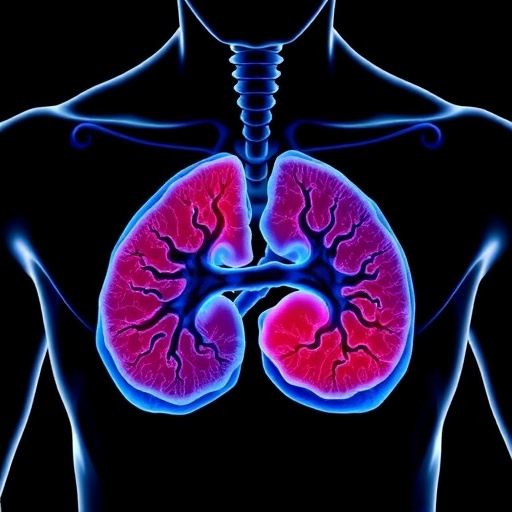Prostate cancer remains one of the most significant health challenges faced by men worldwide, characterized by its dependence on complex genetic regulatory mechanisms to drive tumor progression. Recent groundbreaking research conducted at the University of Michigan Health Rogel Cancer Center has unveiled a critical epigenetic component underpinning prostate cancer growth — histone H2B N-terminal acetylation (H2BNTac). This chemical modification, located on histone proteins around which DNA is wound, acts as a vital marker on enhancers, the genetic “switches” responsible for activating tumor-promoting genes. The discovery of H2BNTac’s central role in enhancer activity not only deepens our molecular understanding of prostate cancer but also opens up novel therapeutic avenues.
The research team, led by Dr. Arul Chinnaiyan, a distinguished professor of pathology and urology and director of the Michigan Center for Translational Pathology, has shown that prostate tumors harbor significantly elevated levels of H2BNTac alongside the enzymes p300 and CBP, which catalyze this specific histone acetylation. These enzymes interact closely with the androgen receptor (AR), a pivotal driver of prostate cancer, to activate enhancers that promote malignancy. The correlation between increased H2BNTac and aggressive prostate cancer phenotypes suggests that this histone modification is a key facilitator of oncogenic transcriptional programs.
Delving deeper, the investigators performed a series of experiments in prostate cancer cell models to establish the mechanistic importance of p300 and CBP in enhancer regulation. They demonstrated that these acetyltransferases are indispensable for the maintenance of active enhancers governed by androgen receptor signaling. By chemically tagging histone H2B at its N-terminal tail, p300 and CBP effectively create a chromatin environment conducive to gene activation, thereby nurturing the cancer’s growth and survival pathways.
With this pivotal insight, the researchers partnered with pharmacology expert Dr. Shaomeng Wang to develop a novel small molecule called CBPD-409. This compound is designed to selectively degrade p300 and CBP proteins, thereby erasing the H2BNTac marks on enhancers. Unlike previously tested bromodomain inhibitors, which only partially hinder p300/CBP activity, CBPD-409 invokes targeted protein degradation—a mechanism that results in complete functional inactivation of these crucial epigenetic regulators and suppression of the oncogenic AR-driven enhancer activity.
Crucially, CBPD-409 distinguishes itself by its remarkable potency and oral bioavailability, making it a promising candidate for clinical application. Preclinical tests revealed that prostate cancer cells exhibiting higher baseline levels of H2BNTac are more vulnerable to CBPD-409 treatment, hinting at the possibility of patient stratification based on epigenetic profiles to optimize therapeutic outcomes. Furthermore, the drug successfully induced tumor regression in murine models of castration-resistant prostate cancer (CRPC), a particularly challenging and treatment-resistant form of the disease.
This study underscores the limitations of earlier p300/CBP inhibitors in clinical settings, which often fell short due to incomplete blockade of their targets. The targeted degradation approach spearheaded by CBPD-409 effectively closes this therapeutic gap by removing these proteins entirely from the cellular milieu. Such a strategy represents a paradigm shift in epigenetic therapy for prostate cancer, emphasizing the power of precision protein removal rather than partial inhibition.
The research offers compelling evidence that the acetylation landscape on histone H2B, driven by p300 and CBP, is fundamental to the enhancer-mediated gene expression that fuels prostate cancer progression. Disrupting this landscape through advanced targeted degraders like CBPD-409 could usher in a new era of effective treatments, particularly for patients with advanced, therapy-resistant prostate tumors.
Given the global burden of prostate cancer—the most common malignancy diagnosed in men in the United States and a leading cause of cancer-related deaths—these findings have far-reaching clinical implications. They not only illustrate the intricate interplay between chromatin modifications and hormone receptor signaling in cancer but also highlight the potential of epigenetic therapies tailored to exploit these molecular vulnerabilities.
Looking forward, the team’s work propels CBPD-409 toward clinical development, representing hope for patients with castration-resistant prostate cancer who currently face limited treatment options. This promising therapeutic exploits the unique biology of enhancer acetylation, combining precision molecular targeting with effective drug design to potentially transform patient outcomes.
In addition to the therapeutic advances, this research provides a crucial framework for understanding enhancer dynamics in cancer biology more broadly. By illuminating how specific histone modifications govern oncogene activation, researchers can now explore similar epigenetic targets across other malignancies, potentially expanding the impact of such targeted protein degradation strategies beyond prostate cancer.
The University of Michigan team’s innovative integration of molecular pathology, pharmacology, and medicinal chemistry exemplifies the future of translational cancer research. Their collaborative effort bridges fundamental discoveries about chromatin biology with tangible drug development, underscoring the value of multidisciplinary approaches in tackling complex diseases like cancer.
In summary, the identification of histone H2B N-terminal acetylation as a hallmark of prostate cancer enhancers, and the creation of CBPD-409, a selective degrader of p300 and CBP, mark a significant leap toward improved therapeutic interventions. This work not only advances scientific knowledge but also offers a beacon of hope in the fight against a pervasive and deadly disease.
Subject of Research: Cells
Article Title: Targeting histone H2B acetylated enhanceosomes via p300/CBP degradation in prostate cancer
News Publication Date: 3-Oct-2025
Web References:
https://doi.org/10.1038/s41588-025-02336-6
https://pubmed.ncbi.nlm.nih.gov/41044247/
References:
Chinnaiyan, A.M., Wang, S., et al. “Targeting histone H2B acetylated enhanceosomes via p300/CBP degradation in prostate cancer.” Nature Genetics, 3 October 2025.
Keywords: Cancer, Prostate tumors, Epigenetics, Histone acetylation, p300, CBP, Androgen receptor, Prostate cancer, Targeted protein degradation, Castration-resistant prostate cancer, Enhancers, Chromatin biology
Tags: androgen receptor interactionscancer biomarkerscancer genetics and epigeneticsepigenetic regulation in cancerhistone H2B N-terminal acetylationnovel cancer treatment strategiesoncogenic transcriptional programsprostate cancer progression mechanismsprostate cancer researchtargeted cancer therapiestumor-promoting gene activationUniversity of Michigan Health Rogel Cancer Center





